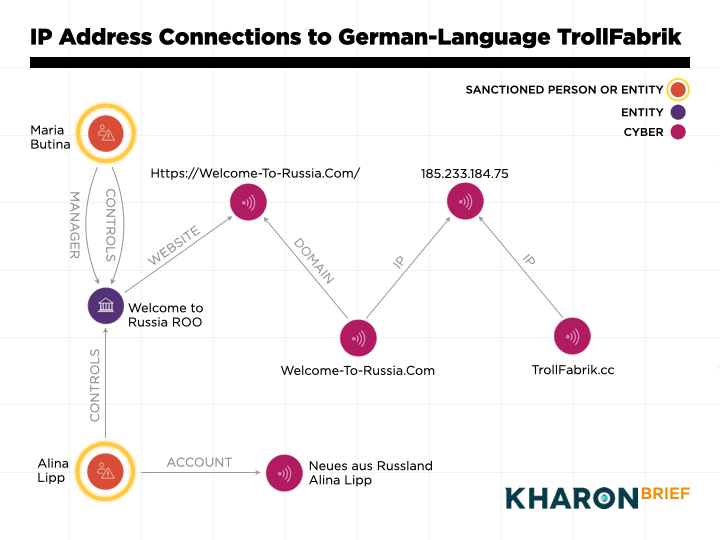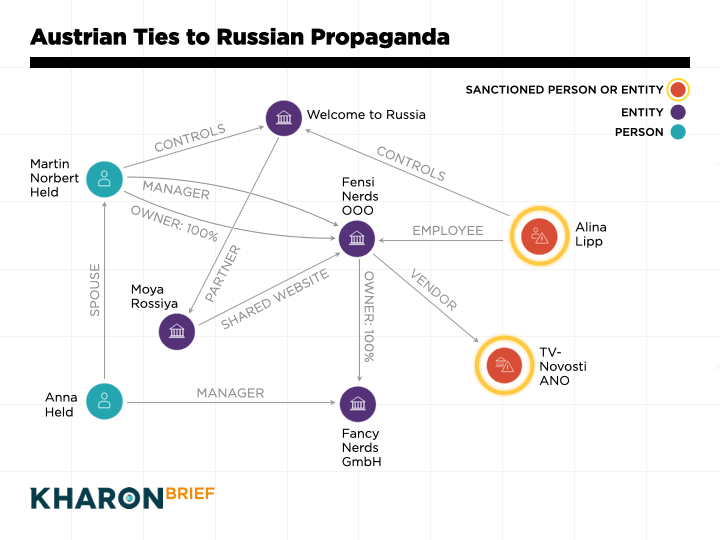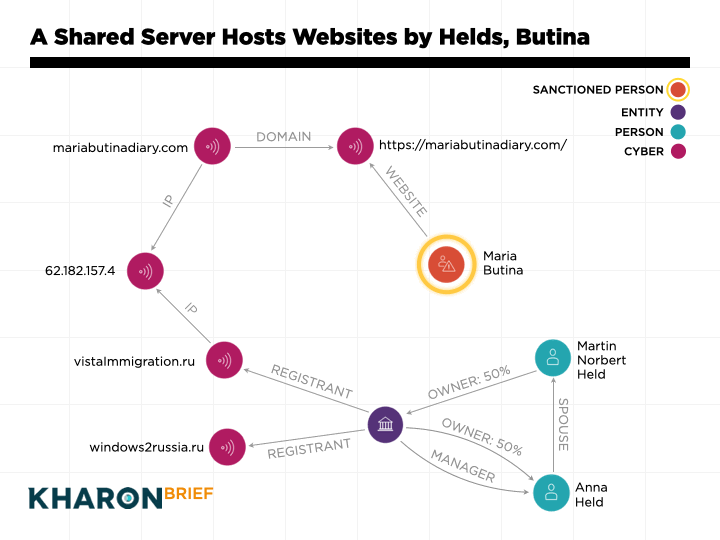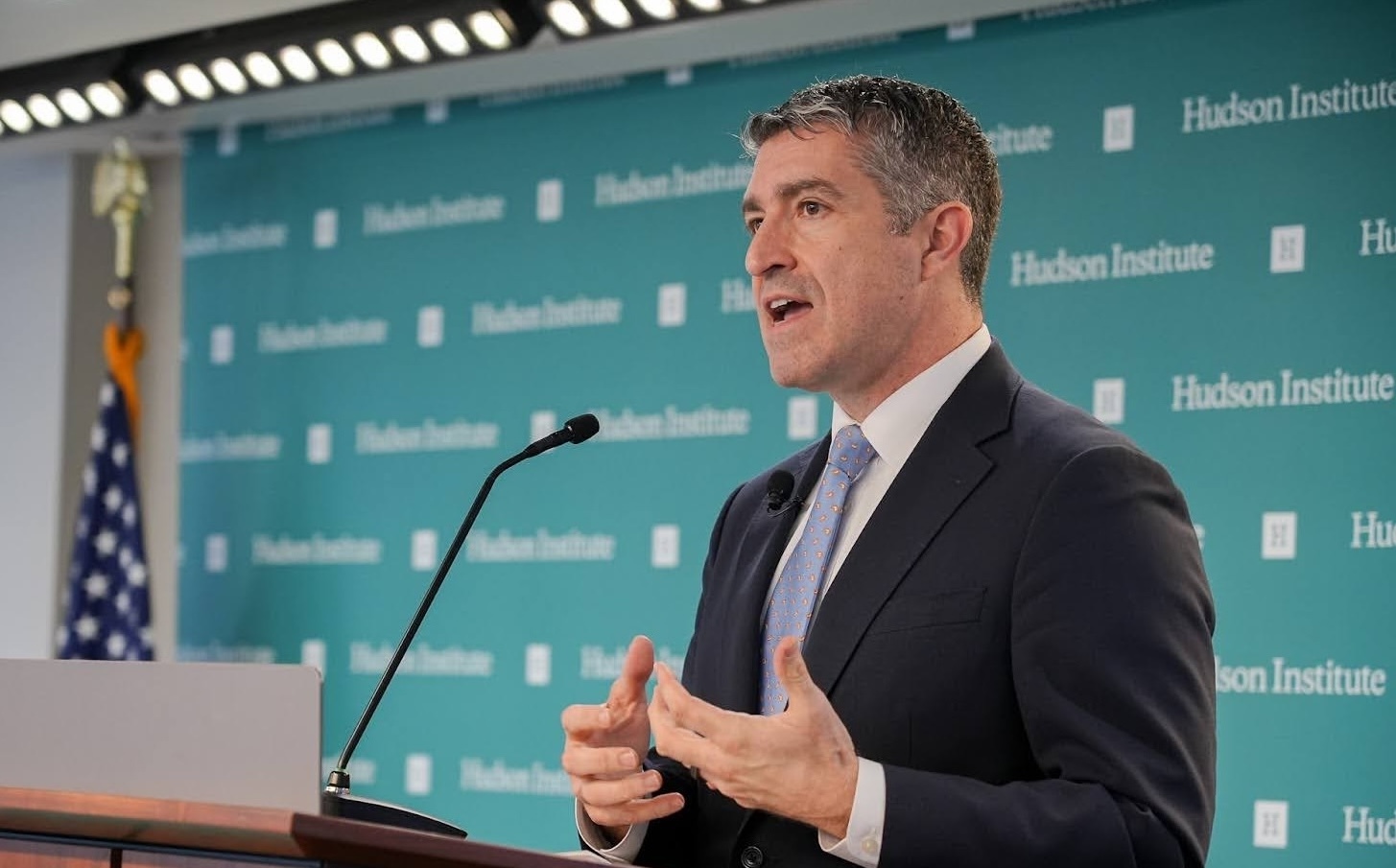The EU’s barrage of designations against Russia’s wartime networks last month targeted shadow fleet vessels, military facilitators, human rights violators and one less common class of individuals: bloggers.
Alina Lipp, a Russian national originally from Germany, was one of them. The European Council designated her, it said, for supporting the Russian war effort in Ukraine by promoting pro-Kremlin propaganda and disinformation on her social media and blog and for making frequent appearances on Russian military news outlets.
Kharon’s research into Lipp found intersections with a string of propaganda entities, other EU nationals and the Russian politician Maria Butina, who in 2018 pleaded guilty to acting as an unregistered foreign agent in the United States.
The network’s key connections, though, didn’t come through Lipp’s blog. They came through her nonprofit—and a chain of shared IP addresses and domain registration companies.
Key figure: Lipp promotes pro-Russia narratives on her blog and to her more than 180,000 subscribers on her German-language Telegram channel, “with a view to manipulating German public sentiment as regards support for Ukraine,” the EU said in its designation statement. In some posts justifying Russia’s full-scale invasion, she has cast Ukrainians as Nazis.
Lipp’s commentary on the conflict has been ongoing for years. In 2021, she reported from Donetsk, Ukraine, “in search of the truth” after Russia’s initial invasion and annexations; in a three-part series she then released in 2023, Lipp interviewed Russian separatists, whom she called “heroes,” and pushed disinformation about Ukrainian activity in the region, such as a targeting of Russian speakers.
The nonprofit: Lipp is listed among the founders of Welcome to Russia ROO, a nonprofit organization dedicated to promoting foreign immigration, travel and tourism into Russia. Welcome to Russia ROO has not been targeted by sanctions itself.
Butina, now a deputy in the Russian state Duma and herself widely sanctioned around the West, is the nonprofit’s president and main founder. In a December interview with the Moscow Times, she described Welcome to Russia ROO as a way for those desiring a more “traditional lifestyle” to seek “spiritual asylum” in Russia.
Alina Lipp, a Russian national originally from Germany, was one of them. The European Council designated her, it said, for supporting the Russian war effort in Ukraine by promoting pro-Kremlin propaganda and disinformation on her social media and blog and for making frequent appearances on Russian military news outlets.
Kharon’s research into Lipp found intersections with a string of propaganda entities, other EU nationals and the Russian politician Maria Butina, who in 2018 pleaded guilty to acting as an unregistered foreign agent in the United States.
The network’s key connections, though, didn’t come through Lipp’s blog. They came through her nonprofit—and a chain of shared IP addresses and domain registration companies.
Key figure: Lipp promotes pro-Russia narratives on her blog and to her more than 180,000 subscribers on her German-language Telegram channel, “with a view to manipulating German public sentiment as regards support for Ukraine,” the EU said in its designation statement. In some posts justifying Russia’s full-scale invasion, she has cast Ukrainians as Nazis.
Lipp’s commentary on the conflict has been ongoing for years. In 2021, she reported from Donetsk, Ukraine, “in search of the truth” after Russia’s initial invasion and annexations; in a three-part series she then released in 2023, Lipp interviewed Russian separatists, whom she called “heroes,” and pushed disinformation about Ukrainian activity in the region, such as a targeting of Russian speakers.
The nonprofit: Lipp is listed among the founders of Welcome to Russia ROO, a nonprofit organization dedicated to promoting foreign immigration, travel and tourism into Russia. Welcome to Russia ROO has not been targeted by sanctions itself.
Butina, now a deputy in the Russian state Duma and herself widely sanctioned around the West, is the nonprofit’s president and main founder. In a December interview with the Moscow Times, she described Welcome to Russia ROO as a way for those desiring a more “traditional lifestyle” to seek “spiritual asylum” in Russia.
- Welcome to Russia ROO’s website, Kharon found, is hosted on the same IP address as a platform called TrollFabrik, which sells German-language pro-Russia and pro-Putin merchandise.

Kharon users can explore this network in greater detail through the ClearView platform.
Expanding the network: Welcome to Russia ROO partners with multiple organizations focused on promoting Russian culture abroad. One is a Russian organization called Moya Rossiya, whose website identifies it as a nonprofit project with a “particular focus” on “migration issues to Russia for individuals without familial ties to the country.”
According to reporting by IStories, an independent Russian media outlet, Moya Rossiya’s website is also listed as the website for a Russian computer software development company called Fensi Nerds OOO; leaked financial documents showed that the company had paid Lipp in 2023 and 2024. Fensi Nerds OOO is owned by Austrian national Martin Norbert Held, another founder of Welcome to Russia ROO.
Notable tie: According to IStories’ reporting, Fensi Nerds OOO received 15.3 million rubles in 2023 from TV-Novosti ANO, the parent organization of the state-controlled network RT. In 2024, TV-Novosti ANO gave Fensi Nerds OOO 30 million rubles for the creation of “audiovisual works.”
According to reporting by IStories, an independent Russian media outlet, Moya Rossiya’s website is also listed as the website for a Russian computer software development company called Fensi Nerds OOO; leaked financial documents showed that the company had paid Lipp in 2023 and 2024. Fensi Nerds OOO is owned by Austrian national Martin Norbert Held, another founder of Welcome to Russia ROO.
Notable tie: According to IStories’ reporting, Fensi Nerds OOO received 15.3 million rubles in 2023 from TV-Novosti ANO, the parent organization of the state-controlled network RT. In 2024, TV-Novosti ANO gave Fensi Nerds OOO 30 million rubles for the creation of “audiovisual works.”

Connecting the dots: Fensi Nerds OOO is the owner of a similarly named IT company in Austria that Held’s wife, Anna Held, manages. (Neither of the Helds has been targeted by sanctions.)
Together, the Helds co-own Geroy OOO, a Russian company that is listed as the registrant of multiple websites promoting immigration and travel into Russia. One of those websites is hosted on the same server as Butina’s website promoting her e-book and TV series, “Prison Diary,” about her time in the U.S. prison system.
Together, the Helds co-own Geroy OOO, a Russian company that is listed as the registrant of multiple websites promoting immigration and travel into Russia. One of those websites is hosted on the same server as Butina’s website promoting her e-book and TV series, “Prison Diary,” about her time in the U.S. prison system.

The bottom line: “My bank accounts in Germany have been blocked, the funds have been withdrawn, and the account has been closed,” a page on Lipp’s blog now reads. “Payments to my Russian bank account are blocked by EU sanctions that the banks are complying with.”
She had opened an account on a donation platform, she said, through which her users could “provide me with appropriate support.” Lipp also urged her followers to buy three books whose sales she said would benefit her, too.
All three were written by Thomas Röper, a German citizen whom the EU sanctioned for propaganda along with her.
Read more on Russia:
She had opened an account on a donation platform, she said, through which her users could “provide me with appropriate support.” Lipp also urged her followers to buy three books whose sales she said would benefit her, too.
All three were written by Thomas Röper, a German citizen whom the EU sanctioned for propaganda along with her.
Read more on Russia:







